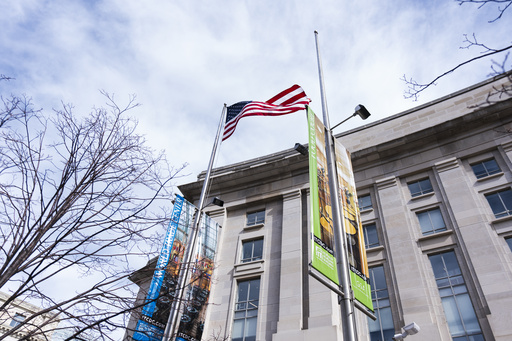Forced furloughs began on Friday for nearly all employees of the U.S. Agency for International Development (USAID), with a mere handful remaining on duty as employee unions sought legal recourse to counteract the rapid dismantling of the agency by the Trump administration, which has been ongoing for about 60 years. A hearing was set for Friday afternoon regarding a lawsuit from federal worker associations claiming that President Trump does not have the authority to shut down an agency established by Congress.
As these developments unfolded, signs outside the agency’s headquarters in Washington were altered with duct tape to obscure the USAID branding, and the agency’s flag was taken down. A bouquet of flowers was left at the entrance, symbolizing the mourning of the agency’s apparent demise.
A group of USAID officials expressed strong disagreement with Secretary of State Marco Rubio’s statements that essential life-saving programs would continue under waivers. Given that most of the workforce was impacted by the furlough and funding had been halted, one official noted the agency had effectively “ceased to exist.” This shift, led by the Trump administration and supported by tech billionaire Elon Musk’s initiatives to slash government spending, marks a substantial erosion of USAID’s operations, which had long been a significant part of the federal aid framework.
On social media, Trump referred to USAID with the directive to “CLOSE IT DOWN,” reflecting his administration’s stance. The administration informed USAID that fewer than 300 employees would likely be exempt from the furlough affecting over 8,000 staff and contractors, according to multiple sources within the agency, creating concerns over the capacity to assist those in need worldwide.
Efforts from the State Department and other officials were made to persuade the administration to allow a larger contingent of USAID workers to remain active, particularly for the transition of personnel and their families stationed overseas. Modifications to this staffing exemption were made later in the day, potentially raising the number of remaining workers to around 600, without clarity on the reasoning behind this decision.
Due to an administration edict, the USAID officials who provided information were asked to remain anonymous. The reduced workforce, alongside local hires abroad, is expected to oversee a limited number of humanitarian programs deemed to remain operational during this period of uncertainty.
It’s still unclear whether the furloughs will be permanent or temporary, with future assessments determining which programs may be restored. The Trump administration has alluded to a major overhaul of USAID, proposing to absorb its remaining functions into the State Department.
Among the critical programs that reportedly did not receive extensions were substantial food supplies valued at $450 million to feed 36 million individuals, and vital water infrastructure supports for 1.6 million war-displaced persons in Sudan’s Darfur region, which are now in jeopardy.
The administration has mandated that overseas USAID personnel return to the U.S. within a 30-day timeframe, beginning Friday, with their travel costs covered. However, officials at embassies have sought exemptions to extend this timeframe for some, including those with children in school. In an announcement on its website, USAID indicated that employees placed on leave would not be compelled to exit their host countries but would be responsible for any expenses incurred if they chose to extend their stay beyond the initial 30 days unless they qualified for hardship waivers.
During a visit to the Dominican Republic, Rubio affirmed that assistance would be provided to employees wishing to return home within 30 days. He stressed the necessity of these actions by suggesting that some staff were attempting to circumvent the suspension of foreign aid payments, an assertion agency staff members refuted.
Despite the closure of numerous programs, Rubio asserted that foreign aid would persist, albeit in a manner that aligns with U.S. national interests. However, members of Congress, particularly from the Democratic Party, have denounced the administration’s moves as illegal without the requisite approval from Congress.
This legal challenge was echoed in a lawsuit filed by the American Foreign Service Association and the American Federation of Government Employees. The lawsuit requests the federal court to order the reopening of USAID offices and to restore functioning and funding, emphasizing the far-reaching negative impacts of the administration’s actions on American workers and global humanitarian efforts.
The suit points out that the government has failed to consider the severe implications of their actions, stressing the detrimental effects on American personnel, the lives of countless individuals globally, and the overall national interests of the United States.




